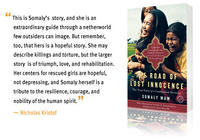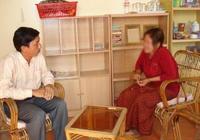The Somaly Mam Foundation Presents at the 2010 Crimes Against Children Conference

SMF’s President and Co-Founder, Somaly Mam, and Executive Director, Bill Livermore, are presenting at the national 2010 Crimes Against Children Conference in Dallas, which runs August 9-12.
The Crimes Against Children Conference brings together professionals from law enforcement, medicine, nonprofits, law, social work, child protective services, and other professionals who work directly with child victims of crime. In the twenty years since the conference was first held, attendance has risen from 50 to more than 3,300 professionals.
The SMF presentation, “Human Trafficking and the Rule of Law: Real World Challenges and Solutions,” focuses on successful approaches that SMF and its partners have taken to rescue, heal, and empower survivors of human trafficking, as well as the importance of awareness and education in the struggle to end modern day slavery.
The presentation focuses on the comprehensive survivor-driven services that are central to the success the foundation and its partners like AFESIP have had in helping survivors of sexual trafficking go on to lead healthy and productive lives. This model, created and implemented by survivor Somaly Mam, provides girls in the AFESIP shelters regular access and support from survivors in SMF’s Voices for Change program – survivors are often the only people that victims trust; and provides the girls with a home in the shelter, health care, psychological care, job training, and a clearly-marked, guided path to self-sufficiency. Once a young woman leaves the shelter to begin employment, she receives visits from SMF and AFESIP staff no less than once a month for three years, ensuring that she has everything she needs to create a bright future for herself.
Despite its effectiveness, this model is not widely used in the US. One exception is the Girls Educational and Mentoring Service, or GEMS, which is based in New York, and offers comprehensive services with extensive survivor involvement.
Public awareness and education are vital if comprehensive programs like GEMS are to expand in the US. Efforts like the New York Mayor’s Office “Let’s Call an End to Human Trafficking” campaign, and training programs for law enforcement can help spread the knowledge that human trafficking does happen in the US, and that victims need access to tailored and comprehensive social services to recover from the horrors that they have experienced.
Similarly, partnerships among government, business, and nonprofits are critically needed to address modern day slavery. Without coordinated efforts, traffickers will continue to fly under the radar, seizing victims from the streets, from schools, and from their families. SMF’s partnership with the United Nations Inter-Agency on Human Trafficking to train law enforcement and government officials in Southeast Asia demonstrates how organizations can work more effectively when they join forces and combine their talents and resources.
In the US, some organizations and government agencies are working in this direction; however, much more still needs to be done to coordinate efforts at the national and local level. We look forward to seeing more partnerships and action taking root at this year’s Crimes Against Children Conference.















Comments
Post new comment